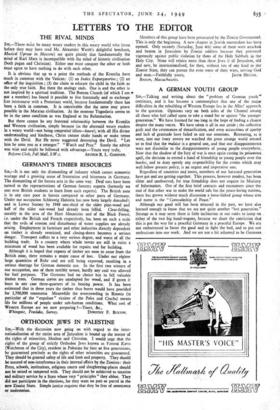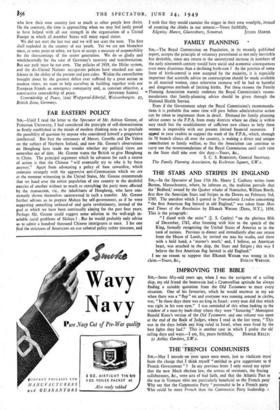A GERMAN YOUTH GROUP Sin,—Talking and writing about the "
problem of German youth" continues, and it has become a commonplace that one of the major difficulties in the rebuilding of Western Europe lies in the Allies' approach to the question. Opinions vary on both sides of the Channel among all those who feel called upon to take a stand for or against "the younger generation." We have listened far too long in the hope of finding a chance despite the many voices. We have taken it all in our stride ; the collective guilt and the ceremonies of denazification, and even accusations of apathy and lack of gratitude have failed to stir our emotions. Retreating, as it were, into our ivory towers we watched the great strange world around us to find that the malaise is a general one, and that our disappointments were not dissimilar to the disappointments of young people everywhere. Now that the shadow of the fury of war is once again casting its poisonous spell, the decision to extend a hand of friendship to young people over the border, and to deny openly any responsibility for the events which may well follow present policy, is an urgent and imperative one.
Regardless of countries and zones, members of our harassed generation have got and are getting together. This process, however modest, has been silent and unobserved, for true friendship does not require its Ministry of Information. Out of the first brief contacts and encounters since the end of that other war to make the world safe for. the peace-loving nations, there has grown without much discussion a loose-linked group whose aim and name is the " Comradeship of Peace."
Although our good will has been misused in the past, we have also learned enough to know that we are not quite another "lost generation." Strange as it may seem there is little inclination in our ranks to jump on . either of the two big band-wagons, because we share the conviction that this is pot the way for a peaceful Germany in a peaceful Europe. We arc not embarrassed to foster the good and to fight the bad, and to put our enthusiasm into our work. And we are not a bit ashamed to be Germans who love their own country just as much as other people love theirs. On the contrary, the time is approaching when we may feel justly proud to have helped with all our strength in the organisation of a United Europe in which all member States will enjoy equal status.
We did not start the last war and we will not start the next. The first shell exploded in the country of our youth. Yet we are not blameless since, at some point or other, we have to accept a measure of responsibility for the shortcomings of the senior generation. We do so gladly and wholeheartedly for the sake of Germany's recovery and transformation. But our path must be our own. The policies of 1919, the Hitler system, and the dis-United Nations occupation policies have smashed our con- fidence in the ability of the present and past rules. Within the constellation brought about by the greatest defeat ever suffered by a great nation in modern times, we want to help ourselves in building together with our European friends an emergency community and, as constant objective, a constructive comradeship of peace. ARNFRIED SADDAI. Comradeship of Peace, (22a) Wuppertal-Elberfel, Weissenburgstr. 27, British Zone, Germany.



































 Previous page
Previous page